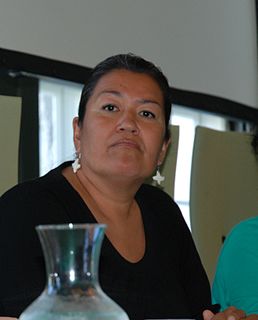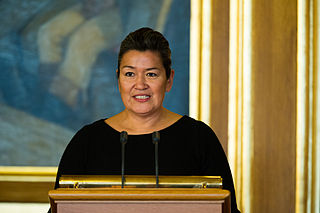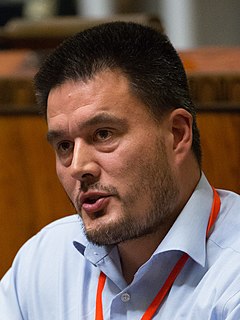
Hans Enoksen is a Greenlandic politician who served as the third Prime Minister of Greenland from 2002 to 2009.
The Democrats is a liberal and unionist political party in Greenland.
General elections were held in Greenland on 2 June 2009. Prime Minister Hans Enoksen announced the election date on 15 April 2009, stating that he would prefer for a newly elected parliament to administer Greenland when the self-government reform takes effect on 21 June 2009. The reform gave more power to the Greenlandic parliament with decisions on most issues being devolved to the parliament but defence and foreign affairs remaining under the control of Denmark.
The Naalakkersuisut is the government of Greenland, a "constituent country" of the Kingdom of Denmark, takes place in a framework of a parliamentary representative democratic country, whereby the prime minister is the head of government, and of a multi-party system. Executive power is exercised by the government. Legislative power is vested in both the government and parliament Inatsisartut. The judiciary is independent of the executive and the legislature. Greenland has full autonomy on most matters, except on policies and decisions affecting the region including negotiations with the devolved legislatures and the Folketing.

General elections were held in Greenland on 12 March 2013. The opposition Siumut party emerged as the largest in Parliament, winning 14 of the 31 seats. On 26 March Siumut leader Aleqa Hammond became Greenland's first female Prime Minister.

Aleqa Hammond is a Greenlandic politician and member of the Danish Folketing (parliament). Formerly the leader of the Siumut party, she became Greenland's first female Prime Minister after her party emerged as the largest parliamentary faction in the 2013 elections. In 2014 she stepped down as Prime Minister and leader of Siumut, following a case of misuse of public funds. She was expelled from Siumut on 23 August 2016 after yet another case of misuse of public funds and became an independent. On 31 March 2018 she announced that she is running in the 2018 Greenlandic parliamentary election for the Siumut breakaway Nunatta Qitornai.
The Inuit Party was a separatist party in Greenland, formed by dissidents from the then-governing Inuit Ataqatigiit (IA). The party was opposed to the so-called big-scale law, and wanted a referendum on the law. Mette Lynge represented the party in the Naalakkersuisut (Government) and was minister for dwellings, nature and environment. At the 2014 Greenlandic general election the party did not win any seats in parliament.

Early general elections were held in Greenland on 28 November 2014. They were called after Prime Minister Aleqa Hammond resigned following a spending scandal. Siumut and Inuit Ataqatigiit emerged as the largest parties both winning 11 of the 31 seats. A three party coalition government was formed consisting of the incumbent Siumut and Solidarity parties alongside the Democrats.

Kim Kielsen is a Greenlandic politician, leader of the Siumut party, and current Premier of Greenland. He was originally a mariner and was a police officer with Rigspolitiet from 1996 to 2003 in Upernavik and Paamiut. Kielsen entered politics in 2005 when he was elected to the Greenlandic parliament for Siumut and to the municipal government of Paamiut. In the government of Aleqa Hammond, he was the minister for housing, nature and the environment. He became acting Premier in October 2014 when Hammond stepped down and the Siumut party subsequently elected Kielsen as its leader, awarding him 44 of 65 votes. On 4 December 2014 his party along with Atassut and Demokraatit formed a new coalition. On 10 December 2014 the new ministers were represented.
Anda Uldum or Andreas René Uldum is a former Greenlandic politician and a former member of the Inatsisartut. He was the leader of the Greenland party Demokraatit. 2015 he became Minister of Finance and Raw Materials when his party the Democrats entered a coalition with the social democratic Siumut and another centre-right party, Atassut. In 2016, he resigned his post and left politics due to health issues. He later moved to Denmark.

Partii Naleraq is a centrist-populist political party in Greenland.

Atassut is a liberal-conservative and unionist political party in Greenland. Founded on 29 April 1978, Atassut is an established partner of the Liberal Party of Denmark.
The First Cabinet of Kim Kielsen is the current government of the Greenland. It was appointed on 10 December 2014 with Kim Kielsen from Forward (Siumut) as Prime Minister, making a coalition between Forward (Siumut), Democrats (Demokraatit) and Solidarity (Atassut). It is a majority government and is right and left winged government.
The Second Cabinet of Kim Kielsen is the incumbent Government of Greenland, in office since 2 February 2016. It is a coalition majority government consisting of Siumut, Demokraatit and Atassut.
The Third Cabinet of Kim Kielsen is the incumbent Government of Greenland, in office since 27 October 2016. It is a coalition majority government consisting of Siumut, Inuit Ataqatigiit and Partii Naleraq.

Nunatta Qitornai is a separatist political party in Greenland advocating for independence. It was founded in September 2017 by former Minister of Business, Labour, Trade and Foreign Affairs Vittus Qujaukitsoq, who had previously been in Siumut and who was subsequently elected in the 2018 Greenlandic parliamentary elections.












